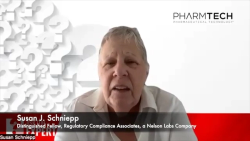
OR WAIT null SECS
- About Us
- Advertise
- Contact Us
- Editorial Info
- Editorial Advisory Board
- Do Not Sell My Personal Information
- Privacy Policy
- Terms and Conditions
© 2026 MJH Life Sciences™ , Pharmaceutical Technology - Pharma News and Development Insights. All rights reserved.
A New Model of an Old Parallelogram
Pharmaceutical Technology Europe
The parallel importing battle continues between wholesalers and manufacturers. The two sides are slugging it out across member states, the courts and even in the streets of Brussels. The EU, meanwhile, has done what it does best - bury its head in the sand and hope that the whole thing blows over.
Many years ago, an Albedo column in Pharmaceutical Technology Europe (or Pharmaceutical Technology International as it was then) included a "cut-out-and-keep" guide to parallel importing, to accompany an exposition of the complexities of this peculiar European Union ([EU] or European Communities, as it was then) phenomenon. It's unlikely that anyone still has their guide, even if they did cut it out and keep it at the time. So, because this year started in Brussels with renewed fever regarding the same subject, Albedo is offering an update on what's been happening inside this particular EU pharmaceutical maze.
The most astonishing aspect of it all is the easiest to grasp - parallel importing is still going on, and it's still a huge bone of contention between major manufacturers and agile wholesalers. Equally astonishing, but harder to understand, is the likelihood that it is likely to go on, and on, and on - until a new generation of pharmaceutical technologists is reading Albedo, or until hell freezes over, or (even less probable) until the EU can resolve the central conflict that gives rise to parallel importing.
Lines in the sand
The conflict arises from a simple rule, familiar to all scientists and to all children making sandcastles on the beach; water will always find its own level. In this situation, the water is represented by successful pharmaceutical products that are sold right across the 15 member states of the EU. And the oddly shaped vessel within which this fluid is contained is - yes, you guessed it - the 15 member states of the EU.
When a company sells its successful product to wholesalers in Germany, the UK or The Netherlands, for instance, it is going to charge a higher price for it than when it sells the same product to wholesalers in Spain, Greece or Portugal. This isn't perversity on the part of the company; it's a consequence of the oddness of the EU. Every member state is entitled to fix its own prices for pharmaceuticals - and typically, southern member states impose much lower prices than northern member states.
If that was the only oddness of the EU, there wouldn't be any parallel importing. Each member state would be, as it were, a hermetic vessel. Pharmaceuticals would be introduced into each market, and would stay there, maintaining a constant level at whatever had been set by the government - lower in the south, higher in the north.
But there is another oddness to the EU. A product available in one member state market can be legally distributed in any other member state market. There are no hermetic national markets. As a consequence, the natural processes of leakage and seepage occur across the EU market. A wholesaler in the north doesn't need to buy directly from the manufacturer in the north - he/she can go south and buy the same product at a lower price there. Then he/she can pump (to strain the metaphor to breaking point - particularly for anyone who is trying to build a model as they read this column) the cheaper version up into a more generously-priced member state in the north, and sell it to retailers there at less than they would normally have to pay, but still retain a profit for him/herself.
The effect is to reduce the volume of manufacturers' sales in the northern markets and to increase them in the southern markets. And because north equals more expensive and south equals cheaper, the total value of the manufacturer's sales across the EU falls.
Naturally, the enterprising wholesalers and everyone paying for drugs in the more expensive northern markets think parallel importing is a good thing. So too does the European Commission (EC). Not because it pays for drugs (it doesn't), and not because it makes any money out of it (it doesn't), but out of dogma. The dogma in question is the free circulation of goods around the single EU market. Free circulation is quite a good idea in itself - and an even better idea for anyone who exercised their rights and bought a Volkswagen Golf (or even more so a Mercedes Benz SL350) in a cheaper EU country than their own.
But free circulation makes an uncomfortable bedfellow with imposed prices. Volkswagen, Mercedes and every other manufacturer of virtually every class of goods available anywhere in Europe can choose to charge differing prices from member state to member state, and take the risk of parallel importing. And they do. But the key difference between cars (or cakes) and medicines is that there is no price control on cars (or cakes), and in most member states there is price control on medicines.
The impending accession of ten more member states on 1 May is going to exacerbate the situation. These are largely former-communist countries of central and eastern Europe, and they are much poorer than the current member states. They all impose price controls on medicines, and the prices they permit are in general very low by EU standards.
So the EU is about to become an even odder shape. But there is absolutely no prospect in the foreseeable future of member states giving up their sovereign right to set what prices they want for pharmaceuticals (or to relinquish any other autonomy they retain in areas of social security and health). And there is absolutely no prospect in the foreseeable future of the EU dropping the dogma of free circulation.
Result? A continuation of parallel importing. And a continuation of the efforts that manufacturers make to limit the scale of this trade.
The news in brief
And now (as any French newspaper might remark at this point in an article) for the news. Two pieces of news, in fact.
The European Court of Justice (ECJ) ruled on 6 January that German drug maker Bayer had not been proved to be breaching EU competition law in the way it behaved when parallel importers were eating into its direct sales during the early 1990s. The ruling was a defeat for the EC and a small, partial victory for major drug firms because it is likely to exert some minor constraints on parallel importing.
The case arose from complaints from parallel importers about the way that Bayer was allegedly trying to limit their operations on its major heart drug, Adalat. From 1989–1993, the prices of Adalat in France and Spain were much lower than those charged in the UK. Those price differences of approximately 40% led Spanish wholesalers (from 1989) and French wholesalers (from 1991) to export a large quantity of Adalat to the UK, selling it on to UK pharmacists at prices lower than Bayer was charging there.
This caused a DM 230 million loss of turnover for the British subsidiary of Bayer, so Bayer at group level then changed its supply policy and began to no longer meet all orders placed by Spanish and French wholesalers. On
10 January 1996, following complaints by the wholesalers, the EC adopted a decision requiring Bayer to change its policy, which it deemed contrary to the EU Treaty, and it fined the company 3 million ecus.
Bayer appealed, and on 26 October 2000, the Court of First Instance (CFI) annulled the Commission's decision. It found that the EC had not proven that there was an agreement within the meaning of EU law between Bayer and its Spanish and French wholesalers to limit parallel exports of Adalat to the UK. None of the documents submitted by the Commission contained evidence proving either that Bayer intended to impose an export ban on its wholesalers or that supplies were made conditional on compliance with that alleged ban.
In turn, the German association of parallel importers appealed against the CFI in January 2001. The recent ruling by the ECJ is the final stage in the process - the Court has dismissed the importers' appeal and has confirmed the judgment of the CFI. The Commission, the ECJ has confirmed, had not proved the existence of an agreement that breached EU rules.
The EC, which is committed to easing parallel trading in the single market, admitted that it was "disappointed" by the Court's judgement, but insisted on the need for a careful reading of the ruling and for further reflection on the definition of vertical relationships - such as between producers and wholesalers. The Commission said it will continue to monitor the pharmaceutical sector carefully "because of its unparalleled importance to the economy, to consumers and patients, and to governments that pay for medicines."
The Commission also noted that the manufacturing industry has since moved on to other forms of dealing with parallel imports. Bayer and other firms have set up what they call supply quota systems, under which each company limits supply to its own estimate of local demand. Some of these agreements have been notified by the companies to the Commission for clearance and have also been the subject of complaints by parallel importers. The Commission is studying the matter closely, it said.
The second item of news is that the EC published a position paper on 19 January attempting to ease parallel importing of medicines, "aiming to help businesses and national administrations take full advantage of the internal market in medicinal products," it said. The Commission provides an update covering the last 20 years, highlighting its conviction that there should be no major administrative barriers to this type of trade. Member state authorities should grant licences to market parallel-imported medicinal products on the basis of a simplified procedure, rather than the full procedure applied to new medicines being marketed in the EU for the first time, it insists.
And the Commission claims that legal certainty has been increased by a series of ECJ rulings, including some on the repackaging of a product imported in parallel. The Court has clarified, for instance, that the protection of a trademark is not without limits, so it may not be used to artificially partition the internal market - which threw out of the window one of the devices that big pharma had tried to use to limit parallel trade. A parallel importer may repackage a proprietary medicinal product and reaffix the trademark or even replace it with the trademark used in the market of destination, provided that repackaging does not adversely affect the original condition of the product or the reputation of the trademark and its owner, the EC stated primly.
Europe's commissioner responsible for the internal market, Frits Bolkestein, said the position paper "makes clear to national administrators the conditions under which parallel imports of medicinal products must be allowed, and to those marketing medicinal products how they must proceed if they wish to undertake such parallel imports. The ultimate aim is to ensure that patients and health care providers can benefit from parallel imports, without taking any risks with patient safety."
Spot the contestants
If there was still any doubt regarding how far the parallel importing dispute is from resolution in Europe, no further evidence need be adduced than the reactions to these two recent developments. Big pharma welcomed the Bayer ruling - whereas parallel importers said nothing. And parallel importers extravagantly welcomed the Commission's late-January position on parallel trade - whereas big pharma said nothing.
The European Federation of Pharmaceutical Industries and Associations (EFPIA), which intervened in support of Bayer in the ECJ case, welcomed the judgement. It drew attention to the Court's finding that the Commission incorrectly assessed the facts of the case and made an error in assessing that there was an agreement between Bayer and its wholesalers. And it flagged up the finding by the CFI that the Commission's conviction that parallel imports will, in the long-term, result in the harmonization of the price of medicinal products was "devoid of all foundation." The final ruling is welcome in so far as it protects the interests of both research-based pharmaceutical companies and patients, said EFPIA.
Edwin Kohl, president of the European association of pharmaceutical parallel traders, gave an immediate and warm welcome to the Commission's position paper. "It stresses the legality of parallel trade and reminds EU countries that any obstacles to interstate commerce and the proper functioning of the single market should be removed," he pointed out. The association claims that in 2002, trade between EU member states - amounting to an estimated 140 million packs - generated direct savings to patients and social health insurance systems in excess of €630 million. But "to deliver such savings, traders need to be free to act," he insisted. He said the Commission "must act against those member states that have legislation impeding parallel trade," claiming that some measures in Austria, France, Germany, Greece, Italy and Spain "are in clear contravention of EU law."



